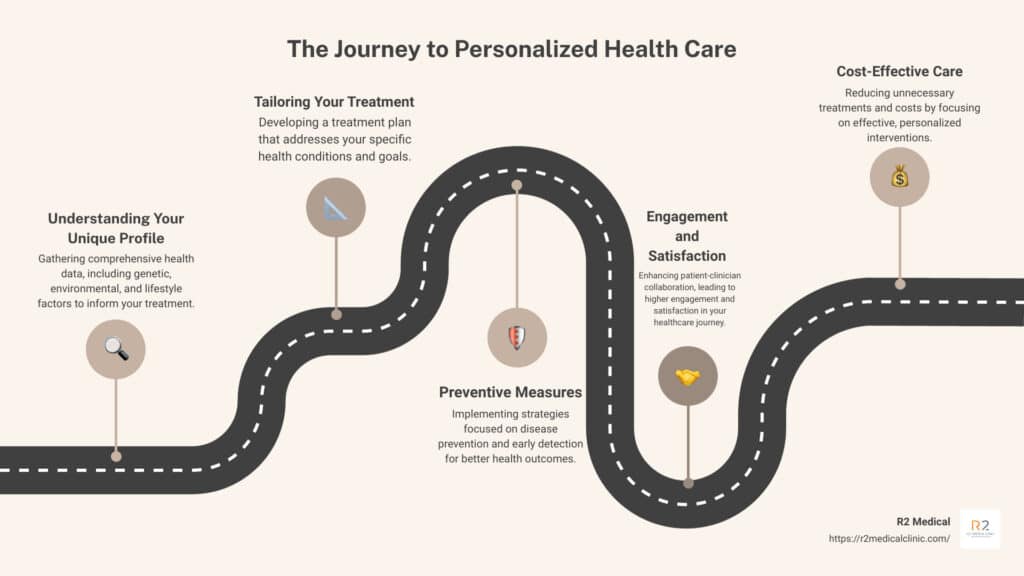personalized treatment planning
Tailored Care for Better Outcomes and Patient Satisfaction
Personalized Treatment Planning for Tailored Care and Enhanced Patient Outcomes
Personalized treatment planning involves tailoring healthcare treatments to individual patients based on their unique characteristics, such as genetic makeup, medical history, lifestyle, and preferences. By leveraging advanced technologies like genomics, AI, and data analytics, healthcare providers can design customized treatment plans that maximize effectiveness and minimize risks. This approach leads to more accurate diagnoses, improved treatment outcomes, and better patient satisfaction. Personalized treatment planning ensures that each patient receives the most appropriate care for their specific needs.
Genomic-Based Treatment Planning
- Description: This approach leverages genetic information to design personalized treatment plans. By analyzing a patient’s genetic makeup, healthcare providers can identify specific biomarkers, mutations, or predispositions to tailor treatments such as precision medicine or targeted therapies.
- Applications: Cancer treatment (e.g., targeted therapy based on genetic mutations), pharmacogenomics (adapting drug prescriptions based on genetic profiles), and rare genetic disorders.
Data-Driven Treatment Planning
- Description: This method uses patient data, including medical history, lifestyle factors, and clinical measurements, to create personalized treatment strategies. By integrating data analytics and AI, providers can predict treatment efficacy and optimize care plans.
- Applications: Chronic disease management (e.g., diabetes, cardiovascular conditions), personalized rehabilitation programs, and tailored mental health treatment plans based on patient history and progress.
Key Approaches to Personalized Treatment Planning
"Genomic Insights and Data-Driven Strategies for Better Care"
Personalized treatment planning is transforming healthcare by tailoring treatment strategies to the individual needs of each patient.
This approach uses a patient’s genetic makeup, medical history, lifestyle factors, and preferences to create more effective and targeted treatments. One key method is genomic-based treatment planning, where healthcare providers analyze genetic information to design customized therapies. This is particularly beneficial in areas like cancer care, where targeted therapies based on genetic mutations can significantly improve outcomes. Another important approach is data-driven treatment planning, which incorporates a patient’s comprehensive data, such as medical history, lab results, and lifestyle factors, to create personalized care strategies. This method is commonly used in managing chronic conditions like diabetes and cardiovascular disease, where ongoing monitoring and adjustments are necessary. By integrating advanced technologies like AI and genomics, personalized treatment planning improves patient outcomes, reduces side effects, and enhances patient satisfaction by ensuring that care is tailored to the individual’s unique needs.

Outcomes of personalized treatment planning
"Improved Efficacy, Patient Satisfaction, and Optimized Healthcare"
Improved Treatment Efficacy
Personalized treatment planning significantly enhances the efficacy of healthcare interventions by tailoring therapies to a patient’s unique genetic makeup, medical history, and lifestyle. For example, in oncology, genomic profiling can identify specific mutations, allowing for targeted therapies that are more likely to succeed. This reduces the trial-and-error approach, ensuring patients receive treatments that are most likely to be effective, leading to better clinical outcomes, faster recovery, and reduced complications.
Enhanced Patient Satisfaction and Engagement
Personalized treatment planning fosters a deeper level of patient engagement and satisfaction by making patients feel heard and understood. When patients see that their care is tailored to their specific needs and preferences, they are more likely to trust their healthcare providers and adhere to treatment protocols. This personalized approach leads to stronger patient-provider relationships, increases compliance with treatment plans, and improves overall satisfaction, contributing to better long-term health outcomes.
Take the First Step Towards AI Excellence – Reach Out Now!